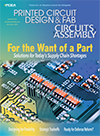News
WEST CHICAGO -- The outlook for sales of connectors remains unchanged: growth of 6 to 8%, according to a leading industry research firm.
However, Bishop & Associates says peak demand in the first half of 2004 raises the bar for those numbers to be reached.
Sales growth in 2005 "will require good demand foer electronics products.... Frankly we are a little concerned," the company said in a recent report.
Order growth has slowed, having declined in October and November. The November book-to-bill -- the most recent month for which data are available, was 1.0, below the year-to-date average of 1.02.
"We envision a scenario in which the first half of 2005 will be flat to the first half of 2004," Bishop said. "If 2005 starts slowly, we believe full year growth in 2005 will be difficult to achieve."
Through November, orders were up 22.2% for the year. November orders slipped 2% sequentially.
Shipments were up 22.9%, the 25th straight month of year-on-year gains.
MINNEAPOLIS - The SMTA seeks papers for its November International Wafer-Level Packaging Congress and Exhibition.The event takes place Nov. 3-4 in San Jose.
Called the IWLPC, the event focuses on leading-edge IC packaging and test technologies with special emphasis on 3D stacked packaging.
The event is also sponsored by Chip Scale Review.
TEMPE, AZ - Three-Five Systems will consolidate its U.S. electronics manufacturing and corporate functions into one location and is exploring possible contraction overseas as well, the company said today. The moves are being made to reduce overhead and excess factory capacity.
TFS, which supplies EMS services, will close its plant in Tempe early this year and move all operations to its Redmond, WA, site. The company did not indicate how many employees would be affected.
The company also said CFO Jeffrey D. Buchanan will resign to remain in Tempe. The firm named James E. Jurgens as interim chief financial officer.
The company also announced that it is exploring opportunities to consolidate its operations in Manila, Philippines. TFS is "working closely" with its principal customer in Manila while also exploring the potential sale of the factory.
TFS lost $47 million on $164 million in sales during the 12 months ended last September.
In a written statement, president and CEO Jack Saltich said, "[S]treamlining operations and driving costs to their lowest possible level are imperative to remaining competitive. While profitability will only be accomplished through a combination of revenue growth and the changes I am announcing today, these actions are a necessary step in that direction."
On Dec. 31, in a move that forecast TFS' announcement, the company sold the building in Tempe that housed its headquarters.
The consolidation is expected be completed during the second half of 2005. TFS currently performs low-volume EMS, prototype and medical manufacturing operations in Redmond.
Several U.S. sales, marketing and engineering support centers will remain intact.
Jurgens was chief financial officer at Ziatech Corp., a privately held developer of embedded computers for telecom applications, which was purchased by Intel in 2001. TFS said other commitments preclude Jurgens from taking the position on a permanent basis.
The company tabbed James P. McClintock, president and chief operating officer, and David E. Gable, vice president and chief financial officer, to handle CEO responsibilities on an interim basis.
The board is actively seeking a new CEO.
Last week the company posted wider-than-expected losses of $38.9 million amid declining revenues and inventory problems.
The 101,000 sq. ft. Wylie plant is home to Lone Star Circuits, which IPS acquired last November in what is considered a reverse takeover.
The company said it would close its PC Dynamics manufacturing plant located in Frisco, TX. PC Dynamics is a wholly owned subsidiary of IPFS.
The firm said it has begun duplicating processes at its Wylie site and should have all of the new lines running within the next eight weeks.
Robert LaGuerra states that differing factors around the world are driving this growth for automotive-specific semiconductors. For example, in Europe and Asia, smaller engines are the norm and there is a defined need to match their performance with those of larger displacement engines. To maximize the performance of these smaller engines, advanced engine management technologies including displacement on demand, variable valve timing and direct fuel injection are being aggressively rolled out in these regions.
The same is happening in the U.S., although this is predominantly due to rising fuel costs and CAFE standards. More specifically, new government legislation mandates that automakers must implement advanced airbag safety systems and tire pressure monitoring systems into future car lines.
LaGuerra cautions, "Automotive processors are proliferating, but in some applications adding too many components that are intended to make the car more reliable, may actually reduce reliability." He adds that in some situations, the industry will actually look to simplify things using fewer, heavier-duty processors.
Press Releases
- Altus Reports Growing Demand for Guidance on Convection Reflow Oven Specification
- Coherix Opens New Adhesive-Dispensing Vision Center in Europe
- Pan Pacific Strategic Electronics Symposium Program Finalized
- The Most Critical 2 Inches in SMT Manufacturing – When a Splice Fails, the Line Fails, Full Stop. Throughput and Yield Depend on One Overlooked Moment


